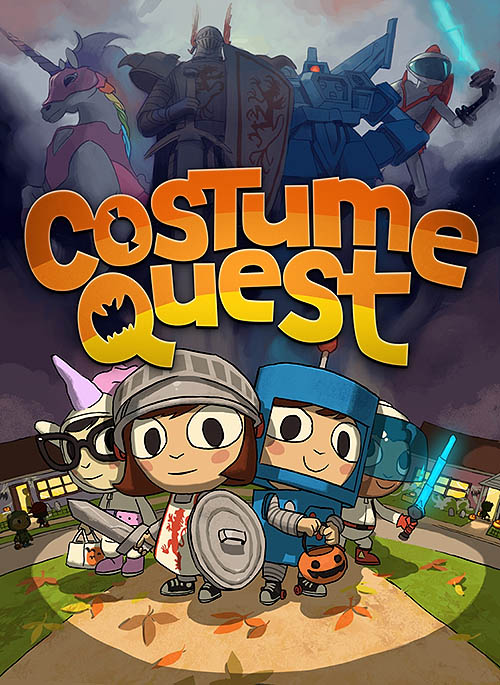It’s been a while, so I’ve got a lot of links. Hold on to your hats.
Games: Costume Quest, Color

If you or someone you know has never played an RPG-style videogame, I highly recommend DoubleFine’s Costume Quest as the place to start (available on PS3, XBOX 360 and Windows). It’s a really delightful entry into the genre, with a lovely theme, brilliant writing, and it’s also quite short, which is a plus in my book. (via Clare)
Meanwhile, I’d previously linked to Method.ac’s kerning and spline games/competency-assessments. There’s now a fascinating one to do with colour, and by introducing a timing mechanic it’s more game-like than objective assessment-like. Give it a go!
Irresistable Entertainment
Some years ago I remember thinking that technology was just going to get better and better at finding content you’d be interested in, to the point where it would be impossible to drag yourself away from the internet. This compilation video of accidents and unlikely events captured by Russian dashboard-cams is about the closest thing I’ve seen to it, in that it’s 14 minutes long but surprisingly hard to stop watching:
http://www.youtube.com/watch?v=E-l4w-DIiXk#!
Kevin Kelly worries that this kind of thing will normalise extremely unlikely events:
We no longer want mere presentations, we want the best, greatest, the most extraordinary presenters alive, as in TED. We don’t want to watch people playing games, we want to watch the highlights of the highlights, the most amazing moves, catches, runs, shots, and kicks, each one more remarkable and improbable than the other.
I’m not so sure that’s the natural conclusion, since the tastes of both the collective in general and individuals in particular is evidently broader. I’m also not sure it’s that much of a problem either (or at least not much different to the norm), as storytelling through the ages has always concerned itself with unlikely (or even entirely fictional) events.
(Incidentally, Russian dash-cams are also the first noticeable stage in the development of an ubiquitous public surveillance network, which on the one hand enable us to get multiple videos of rarely-filmed events such as meteorites, but on the other hand demonstrate how crowd-sourcing is a convenient way to get over the installation-problem for achieving a 1984-style surveillance state).
Echo Chambers and Filter Bubbles
Another interesting effect of the internet’s ability to show us stuff we like is the danger of ‘echo chambers’ (people only reading the work of those they agree with and passing on links and sentiments from those people) and ‘filter bubbles’ (in which people only follow or get algorithmically shown content that supports their own views, reinforcing confirmation bias). Fortunately a study on Facebook’s data suggests that the echo chamber effect isn’t as bad as we might expect.
Meanwhile this review of the Filter Bubble book on BoingBoing raises the very reasonable counter-argument: “anti-filtering” tools are also developing.
Time Lies
Holly Gramazio of Hide&Seek consistently lies about time in order to make game experiences better. This seems reasonable and useful.
Grand Central train station lies in a similar way, although not by setting their clocks fast as this widely shared article’s headline suggests (which would make people panic and run more), but rather by lying about the real departure time of trains (which is slightly more likely to ease those crucial final seconds of a late boarding attempt).
Of course, both of these effects become weaker when more people know about them. What I’d like is a clock modifier for my mobile which sets the time 1 minute fast most of the time, but on a random, say, 2% of days it instead shows the real time, so I’d know I couldn’t simply factor in that ‘extra’ minute.
T.M. 12/04/13: Richard B adds a local example: “In Heathrow Terminal 5 the information screens in the duty free area lie about the gates opening for boarding in order to control passenger flow and disperse them when the concourse is becoming too crowded.”
Time Lapse
Tsuneaki Hiramatsu took some time lapse photos of Fireflies (with a bit of compositing), which turns out to be just as brilliant an idea as it sounds.
What if you just took a vertical slit of a photo, repeatedly, as something moved past, then composited those pixel-thin images? I’m glad you asked. (A technique along these lines may explain how Rainer Gamsjäger’s video “State of Flux — wave #1″, which baffled me at EIFF 2010, was achieved)
Finally, here’s a different kind of Time Slice by Giuseppe Penone, which incredibly is just what it looks like: an old tree, with parts cut away to reveal its younger self:

Tumblr Tips
Tumblr themes commonly hide the link to the ‘archive’ view, but you can get it just by appending “/archive” to the URL. This is really useful when you want to get a quick overview of a Tumblr’s contents. For example, instead of paging through iheartcatgifs.tumblr.com, you can instead go straight to iheartcatgifs.tumblr.com/archive (and then do something else while you wait for the page to load..!)
Alternatively you can use this tool to automatically identify the top 10 most popular items from a Tumblr by year, based on the number of ‘notes’ (although this can take a little while to process, which is fair enough). For example, you can see the 10 most popular comics from Horse eComics (which are based on a Twitter account that tweets random excerpts from books) here.
Maps: Tube maps, Rearranged cities
A popular semi-regular feature of Things is alternative tube maps (see the better tube map, to-scale tube map, curvy tube map, and travel-time interactive tube map). So we might as well just cut to the chase and go straight to this site which excellently curates all manner of tube map variations. (via Sophie)
Meanwhile, in the world of rearranging maps based on non-locational criteria, Odd Things Happen When You Chop Up Cities And Stack Them Sideways.
I’ve sat on this link for far too long – a wonderful Gigapan exploreable photo of London. The distant London Eye, at maximum zoom, reveals the individual people in each capsule. It’s like having super powered vision.
Finally, not enough people seem to know about bird’s-eye-view in Bing maps, which provides a really useful mid-ground between Google’s satellite imagery and streetview. Try it out!








